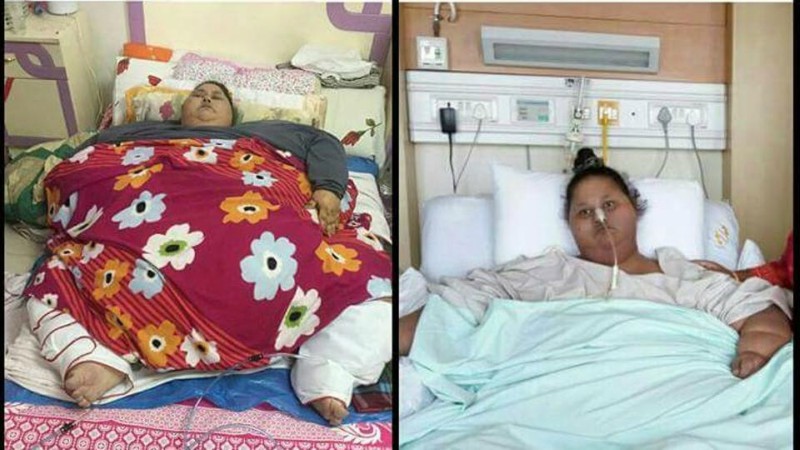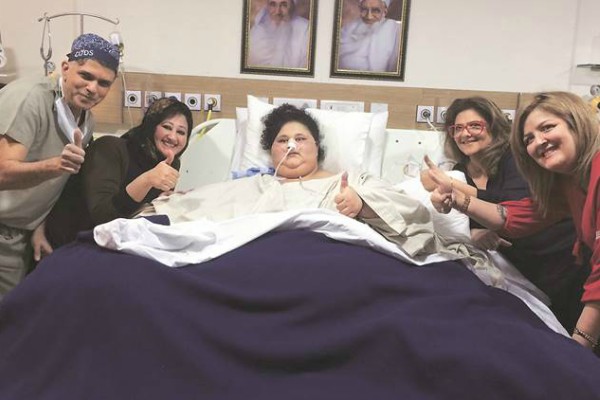The Ethical Dilemma Of The Eman Ahmed Case

Eman Ahmed, touted as the ‘world’s heaviest woman’, has been under the glare of the media lens for the past few days and it has been for all the wrong reasons. Ahmed, who first landed in India in February this year, had come with the hope of being treated for her genetically-linked obesity under the care of renowned Indian doctors.
Unfortunately, she got mixed up in one of the most controversial medical scandals of the year highlighting the growing apathy of the media and medical personnel. It is tragic that Eman has been dehumanised and reduced to a mere object for the gratification of selfish, hidden motives of the medical community. To understand more about her and analyse her case, we need to gauge her personal history.
Eman was born in Alexandria, Egypt. She was allegedly 5 kilos at the time of her birth and she suffers from a genetic problem, which caused her to gain an excessive amount of weight throughout her lifetime. Today, she is 37 years old and weighed nearly 500 kilos before her treatment began in February 2017. She was tagged the ‘world’s heaviest woman’ alive after Carol Yager. Yager was the heaviest woman recorded in history, who weighed 540 kilos at the time of her death a few years ago.
Eman was flown into India and her treatment began in February at Saifee Hospital, a renowned hospital in South Mumbai. She was placed under the care of a team of specialists headed by Dr Muffazal Lakdawala, who performed bariatric surgery on her. Through this surgery, the doctors aimed at reducing the size of her stomach, in turn reducing the amount of food intake. When carried out on severely obese people, bariatric surgery improves cardiovascular risk factors, reduces mortality rates and facilitates long-term weight loss.
The team claimed that Eman now weighs 176 kilos after losing nearly 300 kilos. She was advised long term recuperation and is currently resting at Saifee Hospital. She is unable to speak or move on her own as of this moment.However, her case has been marred by several controversial events that steal the limelight away from the actual potentialities of medicinal miracles. Her sister, Shaimaa Selim in a video that went viral, claims that Eman has not been treated properly by the medical staff. She challenges the doctors’ claims that Eman has lost 300 kilos. “Is it possible to lose 300 kilos in two months?” she asks.

Furthermore, it is her belief that her sister’s health has worsened since her admittance to Saifee Hospital. She also blames the hospital for releasing a picture of Eman on her hospital bed without her prior permission. Her allegations have spiralled into a spat between Eman’s family and the medical team. This spat has restrained Eman’s recovery and brought to the forefront the ugly reality of publicity that often accompanies high-profile medical cases in India. In turn, the doctors have denied all these charges. In fact, Saifee Hospital recently filed a police complaint against the sister because she attempted to give Eman water.
Presently, she is being fed only through a tube. The team also continue to claim that Eman is recovering well. In fact, the humiliation that these charges have brought upon the entire medical community forced one of the doctors on Eman’s team, Dr Aparna Bhaskar to resign from her case. Dr Lakdawala made the following comments in defence of the medical community, “It is unfortunate that the allegations by a non-medical person are being listened to instead of a 13-member medical team’s assessment. Eman is in better health than she has ever been.” It is also a well-known fact that Eman’s surgery was fully-funded by Dr Lakdawala and crowd-sourcing. It was he who assisted in the issuing of her visa and financing of her aeroplane ticket to India. As admirable as his efforts may be, it makes us wonder whether all these efforts were made under the pretence of gaining exposure for himself and the private hospital. As a coin has two sides one cannot deny that an attempt at a publicity stunt was made by her family as well.
As far as developments go, by the end of the month of April Eman is going to be shifted to Burjeel Hospital in Abu Dhabi, UAE on the advice of the medical team working with her in Mumbai. When she was first brought to Mumbai she travelled in the cargo hold of the aeroplane and she will now fly business class as another regular passenger. Modern medicine can create miracles; it can save a person from the depths of irreparable maladies. But modern medicinal science is also subject to scrutiny. Doctors have ethical guidelines to follow in order to preserve the health of their patients at the highest level of priority. Similarly, it is the media’s duty to dispense correct information to the public and follow moral principles while amassing this herd of information.
Eman’s case has a lot to teach all of us; it underscores the importance of focusing on the mental health of patients under scrutiny. Not only should we regard Eman as a normal human being but we must also try to assess the impact that public attention has upon her thought processes and mental well-being. We also learn that as well-rounded individuals we have the responsibility to choose between the right and the wrong information in a sea of ill-guided sources. Instead of tsk-tsking in pity at Eman’s case and many others like hers, we must learn to be empathetic and impersonal in our understanding.





